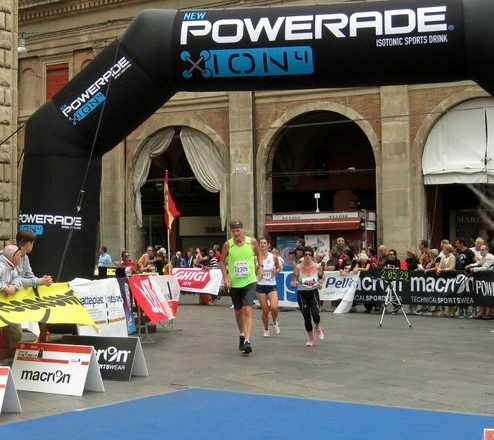People
Nelson Graves runs half-marathon after a stroke
Monday 28 October 2013
 Six years after a stroke that forced him to have to learn how to walk all over again, former Reuters correspondent Nelson Graves, 59, crosses the finishing line at the end of a half-marathon.
Six years after a stroke that forced him to have to learn how to walk all over again, former Reuters correspondent Nelson Graves, 59, crosses the finishing line at the end of a half-marathon.
Completing a 13.1-mile race is a test of endurance for anyone. “I enjoyed an extra dose of motivation knowing that with every step, I was putting distance between myself and that September day six years ago when a condition I had tried to ignore caught up with me,” he said after his recent run.
Born in Buffalo, New York, Graves joined Reuters in 1986 in Washington and then was posted to Paris, New Delhi, Kuala Lumpur, Milan and Tokyo. He discovered he had an irregular heart-beat, increasing the risk of stroke six-fold, during a medical examination in Milan in 2007.
“I was too young to have a stroke. ‘I work 12-hour days, play squash three times a week and haven’t missed a day of work in 24 years’,” he said.
Graves and his family were days away from moving to Japan, where he was to assume a big job. This was no time to pause and reflect. The Milan doctor prescribed a daily dose of ascriptin to cut the risk of clotting; once in Tokyo, he tried an anti-arrhythmia medicine, to no avail.
“My attention piqued, I could now hear my heart’s irregular beat as I lay my head on my pillow. That must explain the dizziness when I get up at night to go to the bathroom. Or the fatigue at the end of a squash match.
“So when, on a September afternoon in Tokyo, my head began to spin wildly and I could hardly speak, I knew what was happening. After an ambulance ride to the hospital and an MRI, I heard the doctor say, ‘You’ve had a cerebral embolism’,” - a stroke.
“I returned to work four days after leaving the hospital and was quickly back into the swing. I could thank my decent physical condition before the stroke but also the hospital care and the anticoagulant warfarin - originally rat poison - that for six years has kept my blood thin.
“Within weeks the numbness on the right side of my face and the difficulty swallowing dissipated. I might have been normal except when I lay my head on my pillow, my heart still played jazz instead of a waltz.”
Surgery at the Cleveland Clinic in the United States, a pioneer in cardiac care, followed. “Nineteen months after my stroke, as I lay comfortably numb on an operating table in Cleveland, with four catheters running from my groin into my heart, I heard the sound of my pulse on the monitor shift from Miles Davis to Johann Strauss. ‘Sinus rhythm,’ proclaimed the surgeon.”
With his heart in a healthy sinus rhythm, Graves was able to resume his previous activities, including competitive squash. And after moving back to Italy, he took up running. “Any anxiety I might have had about long runs was assuaged by the thought - however medically unjustified - that each of my footsteps and breaths were acting as a kind of cardiac metronome, synchronizing my heartbeat.
“Reluctant to dwell on the past, I latched on to the idea of a half marathon as a means to dispel any lingering doubts. Many who know me - and untold others who, thanks to Google, had discovered an article I had written about my stroke - had relegated me to the category of ‘survivor,’ which begs an awkward question: For how long?”
Graves now lives in Bologna where he is director of student recruitment and admissions at Johns Hopkins University's graduate programme in international relations. He is also a member of the Editorial Advisory Board of The Baron. ■
- « Previous
- Next »
- 418 of 576